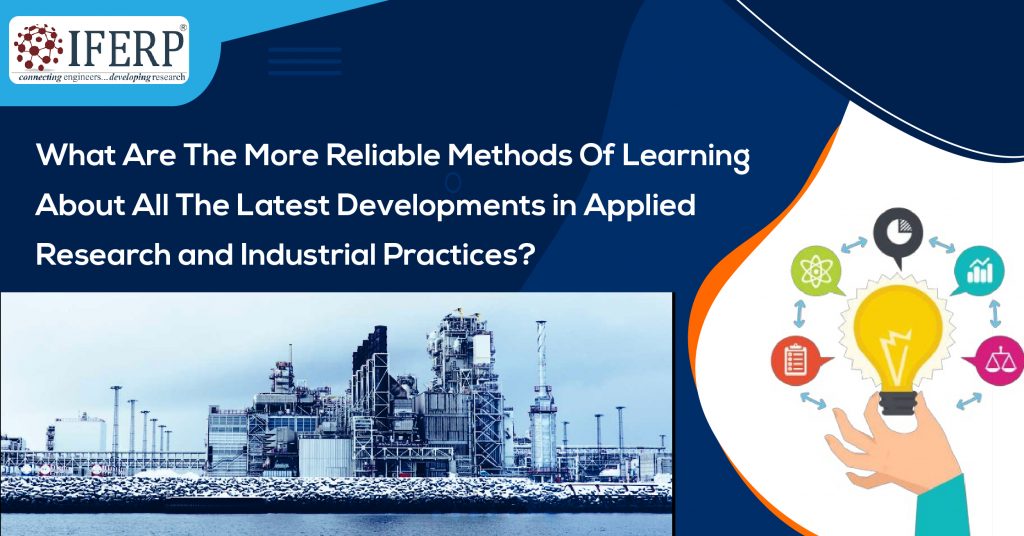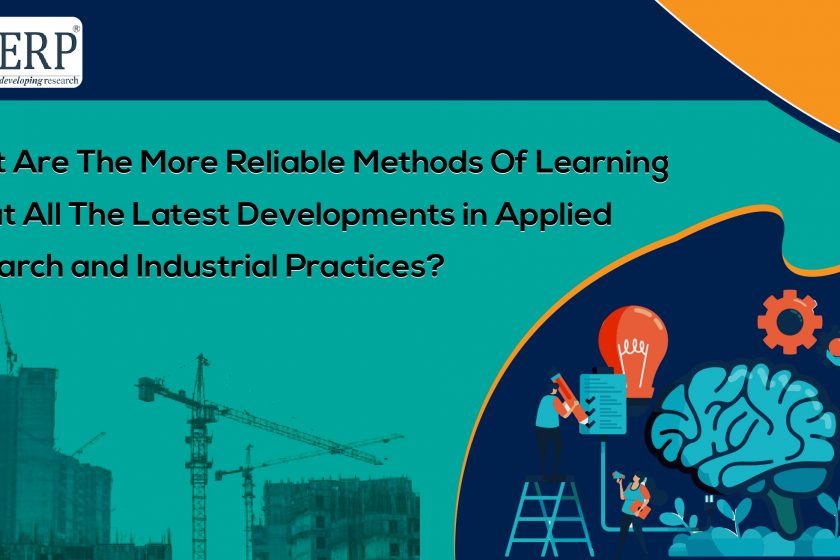Staying on top of new research, especially when it comes to the areas of applied research and industrial practices, can be the most important skill for any researcher, whether you are an aspiring graduate student, an early career/ veteran research scientist, or a widely cited tenured professor. Without actively researching where the current gaps and advancements lie, the writing and research results of professionals involved in these areas, will either be irrelevant or unquestionably out of sync.
In order to capture the attention of domain authorities, publishers, popular journals, and reputed professionals with new discoveries, one needs to know what has been done before. But, when hundreds of articles are published daily in a single area of research, sometimes it seems impossible to follow and really digest the most valuable ideas. In addition, the question of how to prioritize the conduct of academic research when no deadline is set arises.
Detailed below are some of the most dependable methods of easily and effectively keeping up to date with emerging research, by professionals involved in applied research and industry practices.
- Learning How To Effectively Search Online To Find The Latest & Most Pertinent Information
Scientific searches on the web filter content from a large pool of relevant books, journal articles, international conference proceedings, and dissertations. The vast majority of websites sort the applicability of search words entered based on factors such as –
- the textual match of the text,
- how often the work is cited,
- who wrote it, and
- where it was posted.
These can all be adjusted and extended by carrying out ‘advanced searches’ (available in most databases) that allow for more detailed inputs. Most importantly, the key is to identify the concepts and phrases most relevant to one’s specialization with the field, and then perform multiple searches with other appropriate words or phrases, both in broader terms as well as with a narrower focus. Overall, it is crucial to be sure to use terms that will be the focus of one’s own research work.
- Identifying Specialization-Specific Academic Databases
Databases serve as repositories of high-quality content from credible publishers as well as reputable journals and publications. They provide advanced search functions along with, in many cases, the availability of open access results. Some differentiate between library catalogs (for books) from online databases (usually for journals), however, both serve the same purpose – presenting emerging and published research for both general disciplines and very specific specializations.

In order to make things simpler and avoid spending hours on end in search of the most relevant databases, it is highly recommended that one create a reliable list of databases that are the most relevant to their field of study, beforehand. Since every database has unique sources of acquisition, it makes no sense to rely on just one to stay truly informed on all the latest developments in a specific specialization or subdomain within a broader discipline. This might result in one missing out on incredibly niche and highly valuable research articles that are incredibly beneficial when it comes to –
- overcoming a certain roadblock in their research,
- solving a challenge that has been plaguing their progress,
- resolving a lingering doubt about a certain complex concept or theory, and
- oftentimes underestimated – gaining necessary inspiration.
- Opting For Or Subscribing To Notifications
Most editors of journals and popular publications, that members of the applied research community find particularly enlightening, will have the option of subscribing to thematic alerts or join various mailing lists. It’s an easy way to keep up with new articles and issues without having to waste time seeking out such information. Instead, one can depend on such information coming to them without having to move a finger. Posts usually include the tables of contents of the most indexed journals or the most widely read research papers from diverse topics.
- Dedicating Time To Getting Acquainted With Information On The Latest Trends
Very often, professionals get caught up in trying to find the best and most extensive outlets of information. However, getting to know about the best search strategies and the most relevant databases is useless if one cannot simply allocate the time that’s required to read up on new research. Although working hours and daily habits determine how one can make changes to their everyday work patterns, it is advised that academics develop the habit of spending a few minutes each morning browsing recent posts and making a list of articles that seem important and intriguing in their domain of interest, and then download as many of these articles as possible. As the week progresses, taking the time to read through the important sections and noting down points of significance, will help in slowly covering all the listed articles. It is also important to create and maintain a file, either digitally or physically, for the sole purpose of filing relevant research and storing notes. By doing so, one will find that have managed to assemble an impressive list of references within a short period of time.
The International Web Conference on “Recent Trends and Developments in Applied Research and Industrial Practices” which is organized by IFERP in conjunction with Amity University, Kolkata, will offer participants essential tips and tricks on this very topic. Set to take place from the 20th to the 21st of November 2020, registrations for this virtual conference are pouring in from across the globe due to the caliber of speakers enlisted to lecture at this event and the lack of access to high-level expertise in these areas.
- Making Use Of An Organizer
Another method of ordering the articles and resources acquired, read, and notes prepared is to make use of a digital reference manager. Combining this convenient way of tracking referrals with an existing organizational strategy or switching entirely is sure to benefit any academic greatly. A lot of digital organizers available these days even offer the possibility of taking quick notes and creating reminder tags pointing to key research points.
- Looking To Librarians For Neat References
One of the main responsibilities of librarians is to point academics in the direction of the most relevant and highest quality information. Talking to librarians in one’s college or university, depending on their area of expertise, can lead them to discover exciting new articles or a database filled with high-quality, niche research studies and papers.
- Identifying, Registering & Actively Taking Part In A World-Class 2020 Conference
Often conferences and seminars are the sources of the most innovative research. Getting immersed in discussions and meetings at conferences and seminars is a great way to familiarize oneself with research trends, pioneering studies, and the latest innovations. Additionally, one will also gain insight into the upcoming academic literature in their field, as many conferences publish the material used in their events as articles. Although having a real-time presence can also make a huge difference, these days virtual conferences are beginning to become more sought-after than physical ones as they offer pretty much the same quality of experiences as the latter. Additionally, partaking in conferences also offers the possibility of connecting with researchers and networks involved in leading emerging studies in one’s specific field of interest, giving them a practical advantage over their peers and competition.
If you are now eager to take part in such an upcoming conference, you should register for the IFERP-organized International Web Conference on “Recent Trends and Developments in Applied Research and Industrial Practices”, immediately. This conference is the perfect event for anyone looking to enjoy such an experience and reap all the benefits of partaking in a high-caliber international conference.
- Carrying Out Comprehensive Searches
When searching for literature, it is recommended to search backward and forward simultaneously. If an article delves into interesting findings or delves outside the research topic into a new concept, it is vital to not only take a look at the articles it cites but also at the articles that cite it.
- Taking Time To Build & Establish A Presence Online
Professionals engaged in applied research shouldn’t shy away from using social media and other online media to engage and discover new communities and academic forums. This is because they might miss out on researchers working in similar fields of study who will also want to get in touch, offering access to relevant research activity and the opportunity to further promote similar research. One can connect to their own university’s webpage, adding credibility and increasing the likelihood of engagement. From there, writing blog posts that feature updates on their latest publications and research projects will open the door for them to collaborate with other academics doing similar research.
- Choosing To Go Through Portions Of Research Papers That Are Most Relevant
Oftentimes, professionals can get bogged down by unnecessary detail in research papers. To avoid this it is important not to read an article –
- too quickly,
- too broadly, and
- too comprehensively.
It is impracticable to keep up with everything that is important. Using one’s instinct as an expert and an inherent understanding of their field of research to browse through the material and rule out work that is more than likely dull, should stand them in good stead when it comes to vading through low-quality research.
- Placing Inquiries With Peers & Colleagues
Stay in touch with coworkers and talking to them about developments in the field is a great way of learning about anything that one might have missed out on or overlooked while carrying out their research. Inquiring after the recent discoveries in one’s specialization doesn’t make them ignorant or disconnected, but in fact diligent. Discussing the research carried out in a recent article with other academics, and inquiring of them to find out if they read anything similar is another great strategy to learn about new research.
For researchers, students, academics, and scholars from the field of applied research, it is important not to miss out on all the opportunities to follow emerging research and learn about the latest industry practices. The tips above will help these professionals become more informed and engaged. Register international conference being organized by IFERP and Amity University, Kolkatta on “Recent Trends and Developments in Applied Research and Industrial Practices“. You are sure to get to know about numerous emerging trends in applied research and industry practices that will set the course for how progress in these areas will take place in the future.



It’s amazing to pay a quick visit this web page and reading
the views of all mates on the topic of this post, while I
am also eager of getting know-how.
Feel free to surf to my web-site – True Libido Boost Review
Great write-up, I am normal visitor of one’s blog, maintain up the nice operate, and It’s going to
be a regular visitor for a long time.
Here is my web page; Virilyn Pills
Howdy very cool web site!! Man .. Beautiful
.. Superb .. I will bookmark your site and take
the feeds also? I’m satisfied to seek out numerous useful info
here within the put up, we want develop extra techniques
on this regard, thanks for sharing. . . . . .